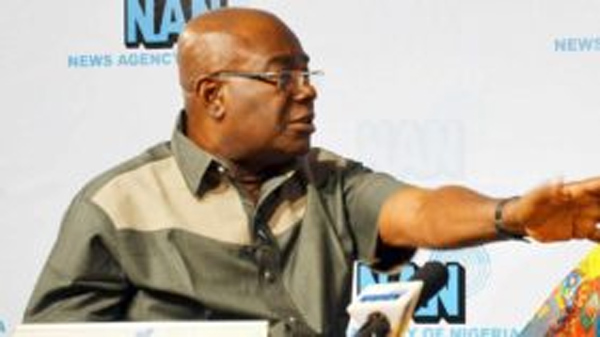-
 Says Jonathan, Buhari scuttled 2016 headcount
Says Jonathan, Buhari scuttled 2016 headcount -
‘Nation needs N280b, 36 months preparation’
By Nnamdi Ojiego
Chief Eze Duruiheoma, a Senior Advocate of Nigeria, SAN, is the immediate past Chairman of the National Population Commission, NPC, the body saddled with the responsibility of organizing census, amongst others. In this interview, the former Chairman of the Peoples Democratic Party, PDP, in Imo State, explains why the commission under him could not organize a national census.
He also says it will cost about N280 billion and 36 months of preparation to conduct a qualitative census that will stand a test of time. Excerpts:
Why is there no census in Nigeria 15 years after?
The last census was in 2006. By convention, the next one should have been in 2016. And as a matter of fact, preparations were on to have it conducted but the unexpected happened. In 2015, there was a change of government and it would not be reasonable to expect an incoming administration to embark on such a fundamental and cost intensive thing like census without studying the ground. We had put some programmes and structures on the ground for the national exercise.
The first thing we did, and in fairness to President Muhammadu Buhari, even before he assembled his cabinet, we were the first constitutional body that he granted audience. And during that audience so to say, we acquainted him with our programmes, what we were planning and needed his buy-in and, of course, he promised to do something but, again, in fairness to him, there was something the previous administration of President Goodluck Jonathan failed to do and that was a major hitch to any serious talk about census.
Presidential Proclamation
And that thing was President Jonathan failed to make a presidential proclamation. Yes, there’s no law prescribing that before you do a census, there must be a proclamation but it is a statement of intent. A presidential proclamation from the President is a notice to the world that Nigeria is about to embark on a very serious exercise like a census and that, from every available evidence, tells the world what we intend to do and solicit their help because no country does census on its own. More so, developing countries need some kind of assistance, technical or whatever, from outside sources. That’s only way you can get them to show interest in what you are doing. In fact, we needed to do that because, it got to a point donor agencies were begging us to get a presidential proclamation on this matter and they will come in and assist. But I didn’t know what happened, President Jonathan didn’t do it.
Did you write to President Jonathan requesting he make the proclamation?
That’s what I’m telling you. We started with Jonathan, in fact, the discussion with Jonathan on the matter lasted till his last day in office before he told us “sorry, I can’t do it, let the incoming administration handle that”. So, that’s what happened and when the incoming administration came in, we approached them, told them everything we had done and what we were expecting from them.
N280b Budget
Again, promise was made that the proclamation would come but, unfortunately, it didn’t come and there’s no official statement as to why it didn’t come. All we heard on the matter was just speculation, maybe, the cost was so prohibitive because, at a time, we presented a budget of N280b but, officially, we were asked to look at that budget again and prune it down and we succeeded in pruning it down to about N220b. Some people will ask: “Why do you conduct a census with that kind of money?” Well, one may say that the question may not be entirely wrong but at the same time, if you look at the benefit of a census, if you look at what any country can gain from properly conducted census, you will agree with me that no amount of money spent on it is a waste.
Qualitative Census
However, the question is, why is this one particularly expensive? Because we were reminded that the last census didn’t cost up to N50b or so, why is this one so? Yes, the reason is simple. We wanted a qualitative census, a census that will stand a test of time, a census whose outcomes will not be a subject of unnecessary acrimony and litigation, that was what we aimed at. How did we intend to achieve it? By deploying technology.
In fact, the kind of technology that will prevent one thing that was so common place in previous censuses such as double and fictitious enumerations. That is, enumerating none existing people and all that. We wanted to eliminate them to the barest minimum. So, this technology, which definitely will cost money, shot up the cost of the census. So, we were then told to prune it down, of course, we looked at it critically and brought it down to about N220b. That was last communication on the matter till I left.
Aside fictitious figures, what other things can make a census unacceptable?
Double Enumerations
The integrity of any census can be questioned on the basis of fraud, which I have mentioned. One, counting ghost people, double counting, that is, double enumerations etc. Now, census like elections, you know, elections are conducted in polling units, and that’s why they have registrations within that polling units. The same thing applies with census. There’s what we call enumeration areas, like a cluster. For example, let’s say Owerri is divided into clusters of about 500 households. Each cluster is an enumeration area. So, being able to carefully demarcate all the communities, all the towns and cities, within this defined framework, that is, if you are talking about 500 households, making sure that they are 500 households. On the day of enumeration, one enumerator or two or more will be assigned to one particular cluster, an enumeration area. That is for the effectiveness. If you don’t do that and come into Owerri, you can’t start counting people on the street because the chances are that you will count one person two or three times. You must be able to pin them down to their localities, to their communities and count them.
Deploying Satellite
First of all, it is done by satellite, then identify them on the ground so that there will be coordination. That again adds to the quality of what’s done. And on the day of enumeration, you don’t find two persons or more counting one area twice.
An enumeration area well defined is now well known and is assigned to enumerator(s). With this, it will be difficult to have double or multiple enumeration of an area because the work is so spelt out that everybody knows what they supposed to do.
Aside funding, is there any other major challenge?
Yes, funding is important but having the manpower is also very important. So, it behooves the commission to train its staff. As a matter of fact, let me share this with you. The problem that commission has now is erosion of manpower.
The place is in need of highly qualified technical manpower. You know, those people that took part in previous censuses have all retired. So they have a new crop of people and there’s no guaranty that this new crop of people has the requisite experience to carry on this assignment whenever it comes up.
Did you do anything to solve this particular problem?
Of course I did. I conducted several training workshops for the staff. And in order to give them a feel of what lies ahead, I made sure that we devoted every little kobo we got to doing limited demarcation of enumeration areas, in a full dressed rehearsal of a census.
READ ALSO: 13 killed, 21,000 displaced by community attacks in DRC’s Greater Kasai region
There should be nationwide demarcation but because of limited funds, what do you do? You come to Imo and do Owerri only. Owerri is just one local government out of 27. So, that’s what I called limited demarcation of enumeration areas.
What are the consequences of absence of census in a country like Nigeria?
The consequences are so obvious. You see, the problem we have in this country is we place emphasis on the wrong things.
At times, people look at issues of census and population from the myopic angle of revenue allocation, political representation in states and national assemblies, but the benefit of census goes beyond all that. In a well conducted census, for example, here in Owerri, we should be able to identify how people live, that is, their housing, the kind of amenities they enjoy such as electricity, water supply, schools, health facilities etc., all these make part of census outcome.
Basic Amenities
So, a census result is a picture of a population – where they live, how they live and the number of people in an area. Often times, our emphasis is on number, forgetting these other areas. The data obtained from census will help in bringing basic amenities to an area. For example, the census figure for Owerri may show that there ought to be 2, 000 primary schools but what is currently on ground is 50. That shows there’s a shortfall in the number of primary schools in Owerri and that is what the census has revealed. An accurate census has revealed that Owerri had a shortfall of primary schools, hospitals etc to the tune of this or that. Unfortunately, people look at how much money that would be accrued to the state as a result of high number but if you look at some of the problems that associated with census, the problems are arising from the fact that people want to give up numbers for the purposes of allocation of revenue. And for how long can we continue in that way?
Questionnaires
Like I said earlier, in a census, there’s a list of questions, what we call questionnaires, given to respondents. If you come into this house and you want to do a census, there are questions each respondent will answer. Now, the aggregate of those questions, the outcome of those questions will constitute the census results not just the number of people counted. Census is not all about headcount, no. It goes beyond that, that’s what I’m saying.
How can Nigeria conduct an acceptable headcount?
By making sure that we’re honest with the exercise because everybody will benefit from it. What people are looking at now are the short term gains. Most people are not thinking about the long term which should concern everybody. The governor is thinking about how much money will be coming in as revenue. I don’t want to talk about what the money is used for but the money is frittered away, it’s wasted, leaving tomorrow’s problems unsolved.
Do you see the present administration of Buhari committed to conducting a national census in the near future?
Well, I don’t know what programme they have but speaking as somebody who knows how the thing works, there must be a preparation period and that preparation period cannot be less than 18 months. In other words, if this administration wants to do a census, there must be at least a period of 18 months to enable the population commission to prepare.
I’m not saying 18 months is adequate but at least in the present situation in which the commission finds itself in which technical experienced manpower is acutely lacking, it should be given at least 36 months to do a good census, not just for a headcount because, if we want to do only a headcount, we’ll still run into the old problems.
Vanguard News Nigeria
The post CENSUS: We tried to stop Nigeria from counting ‘ghosts’ — Duruiheoma, ex-NPC Chairman appeared first on Vanguard News.












![[Video] Speaking In Tongues - Oyereyi](https://1.bp.blogspot.com/-_AsYnQoWjCs/YTy9dQfbceI/AAAAAAAAQyM/bUPsq9lMM_UHqmspyN2qCp4x5hAc2iUywCLcBGAsYHQ/w680/Screenshot_20210911-152304%257E2.png)






Advertise your business here at cheap rate and get large audience to your market. Call/Msg Teemikemedia: 07060733664 to get started.